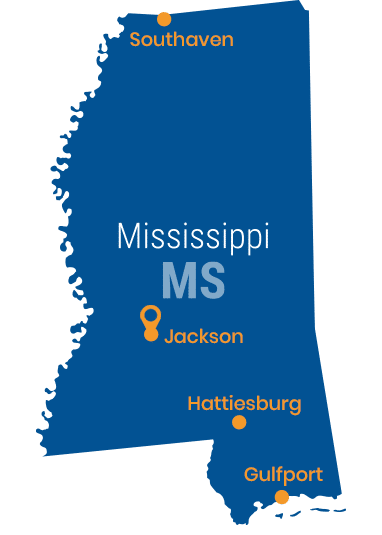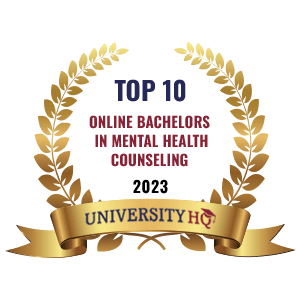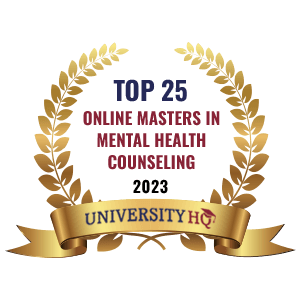What is a Mental Health Counselor?
The study of mental health counseling is ideal for those interested in studying how to manage and overcome various emotional and behavioral disorders. Many colleges and universities in Mississippi offer this major, with graduates generally qualified to pursue engaging and impactful career opportunities.
Mental health counselors advise people on a range of issues using psychotherapy and various psychological treatment services. They may provide support to single persons, couples, families, and/or groups. In order to help their patients manage various mental health conditions, these professionals regularly help process through complicated emotions and behavioral patterns. Mental health counselors may also offer guidance and various therapeutic practices.
While capable to assisting with numerous emotional and behavioral conditions, they commonly diagnose and treat the following: anxiety, depression, mood disorders, personality disorders, obsessive compulsive disorder, post-traumatic stress disorder, eating disorders, behavioral addictions and psychoses.
It’s important to realize that mental health counselors are not psychologists or psychiatrists. This means they are generally not capable of prescribing medications. Most mental health counselors have the knowledge and skills needed to treat patients of all ages and demographics. Some professionals in the field do, however, opt to specialize in the treatment of certain groups more than others. Possible examples include children, adolescents, the elderly, disabled individuals, or military personnel.
While counseling licensure in Mississippi is standardized across the state, expectations can vary by job. In most cases, however, mental health counselors are responsible for performing client evaluations and treatment readiness assessments, as well as managing resulting treatment plans. It’s also common for these professionals to collaborate with support groups, out-patient clinics, and healthcare providers by making patient referrals.
Prospective professionals should consider this field carefully before enrolling in academic programs. Clinical mental health counseling can be emotionally challenging, especially when working with particularly trouble patients facing exceptionally difficult situations. While providing successful treatments can be highly rewarding, the work can also be stressful and/or draining. Additionally, some jobs require professionals to take on large workloads and irregular hours.

Featured Online Programs
Online Mental Health Counseling Education in Mississippi
Prospective students should realize, however, that not all higher education institutions have programs in mental health counseling at every academic level. General counseling is a common major, but the mental health specialization may require attending certain schools and/or pursing more advanced degrees. Those interested in the field may also want to give preference to colleges and universities located in Mississippi. These institutions will offer the most geographically relevant instruction and ensure enrollees are prepared to meet state licensure guidelines.
According to the US Bureau of Labor Statistics (BLS), employment of substance abuse, behavioral disorder, and mental health counselors is expected to increase by 22% from 2021 to 2031. This is much faster than the average for all occupations and will result in an additional 43,600 new job openings throughout the nation each year. Employment for social workers and other community and social services specialists is also expected to increase by 12%, which will result in additional entry-level jobs available to counseling graduates.
The educational services, healthcare, and social assistance industry is the third largest in Mississippi. It accounts for $10 billion in revenue each year. As of May 2022, the state had 1,930 of these professionals employed locally, with an annual mean wage of $45,570. Graduates may also qualify for work in many community and social service occupations. As of May 2022, Mississippi employed 15,860 workers in this field, with an annual mean wage of $42,680. It is important to realize that both wage estimates are comparable to the state’s annual mean wage for all occupations, which was $45,180 in 2022.
Students interested in earning a degree in this field can attend various counseling programs in the state of Mississippi. Options include Mississippi College, Mississippi State University, Jackson State University, Mississippi University for Women, the University of Southern Mississippi, etc. Whether you attend a school in your local community or elsewhere in the state, you can gain a counselor education from various graduate programs offering options from a comprehensive school counseling program and training in many counseling techniques to fully preparing you for private practice.
Many colleges and universities in Mississippi offer degrees in counseling and other related subjects. In most cases, students will be able to choose from options at the associate, bachelor’s, master’s, and doctoral levels. While it’s fairly easy to find employment in the field, it is important to realize that the opportunities available are greatly impacted by the type of degree earned. Those who complete more advanced programs generally receive preference for more prestigious and well-paying occupations.
Online Associates (AS)
Associate degrees in mental health counseling are more uncommon than other academic options. Those interested in studying at this level will likely have greater success pursuing other related areas of study. Possible alternatives include general counseling, mental health, human services, behavioral science, social science, and psychology.
Degrees of this kind generally consist of 60 credit hours of coursework that take full-time students approximately two years to complete. As undergraduate programs, they are typically comprised of both general liberal arts and major-specific class requirements. Every curriculum is different, but those enrolled should anticipate receiving a broad introduction to the field.
It’s important to realize that this type of degree does not meet the minimum requirements of counselor education for licensure in Mississippi. It can, however, lead to a variety of entry-level jobs in community and social service. Alternatively, graduates can use the knowledge and skills obtained to pursue further education by enrolling in bachelor’s degree programs.
Online Bachelors (BS)

Bachelor’s degrees in mental health counseling are also uncommon. Other related major areas of study are more readily available, however. As a result, students regularly pursue programs in counseling, mental health, human services, behavioral science, social science, and psychology. Notably, some institutions do offer mental health counseling as a concentration.
Degrees of this kind generally consist of 120 credit hours of coursework that take full-time students approximately four years to complete. As undergraduate programs, they are typically comprised of both general liberal arts and major-specific class requirements. Every curriculum is different, but students can expect to study various behavioral health and counseling theories.
It’s important to realize that this type of degree also does not meet the minimum requirements of counselor education for licensure in Mississippi. It can, however, lead to various entry-level community and social service occupations. Alternatively, graduates are often well-prepared for enrollment in master’s degree programs.
Find Your Online Mental Health Counseling Program
Online Masters (MS)

Master’s degrees in mental health counseling generally range from 30 to 45 credit hours of coursework that take full-time students approximately two to three years to complete. Curriculums vary, but students can typically expect to study lifespan development, attachment theory, group dynamics, interviewing techniques, counseling theories, diagnostic practices, and ethics. It’s also common for those enrolled to participate in supervised counseling experiences, which provide hands-on experience in the field.
Notably, this type of degree does meet the minimum requirements for counseling licensure in Mississippi. Alternatively, graduates may be able to seek employment in other counseling or community and social service occupations. Completing graduate school often leads to more job opportunities and higher pay. Counseling students can also choose specializations when earning this advanced degree in clinical mental health counseling, school counseling or school psychology, couple and family counseling, regular and vocational rehabilitation counseling, educational psychology, college counseling, and other related educational programs that allow you to work in private counseling practice.
Online Doctorate (PhD)
A PhD or doctorate in clinical mental health counseling may consist of between 60 and 120 credit hours that can take full-time students up to seven years to complete. You can earn a PhD in clinical mental health counseling no matter what your specialty has been up to now: school counseling, rehabilitation counseling, etc. Program specifics vary but most are designed to provide highly advanced instruction in specialized topics. Students can also typically expect to study both qualitative and quantitative research methods, which are likely to be used during dissertation preparation.
This type of degree exceeds the education requirements for counseling licensure in Mississippi. In addition to pursuing professional counseling positions in the state, graduates may apply for work in other clinical settings or as secondary education instructors.
Become a Mental Health Counselor in Mississippi
Individuals offering counseling services in the state of Mississippi must be licensed to practice by the state. This process of overseen by the Mississippi State Board of Examiners for Licensed Professional Counselors.
There are three types of licensure available:
- Professional Licensed Professional Counselor (P-LPC)
- Licensed Professional Counselor (LPC)
- Licensed Professional Counselor Supervisor (LPC-S)
It’s worth noting that the Mississippi State Board of Examiners for Licensed Professional Counselors has also established the Counseling Compact Commission. This offers eligible licensed professional counselors a new method for providing services in other member states. The intention is to make interstate practice easier.
In order to protect the public health, safety, and welfare of residents, the Board has established various professional requirements and standards to regulate admittance into the field. Each option has unique educational, examination, and experience components that must be fulfilled prior to becoming licensed.
- Provisional Licensed Professional Counselor (P-LPC)
A Provisional Licensed Professional Counselor (P-LPC) is licensed to practice counseling in Mississippi, but only under the supervision of a Mississippi Licensed Professional Counselor – Supervisor (LPC-S). When properly supervised, these professionals are allowed to provide counseling and/or psychotherapy services to individuals, groups, organizations, corporations, institutions, government agencies, and/or the general public for a fee, monetary or otherwise. As P-LPCs are unable to practice independently, all work hours go towards supervised experience requirements for further licensure.
To qualify to apply to become a P-LPC, candidates must meet pre-application requirements. The only requirement at this level is to possess a qualified master’s degree in counseling. The program must have the word “counseling” in the title and consist of at least 60 semester hours.
Afterward, applicants will need to set up an Applicant Profile through the Mississippi State Board of Examiners for Licensed Professional Counselors website. This is where the application and supervisory agreement can be found. Candidates must designate a Licensed Professional Counselor – Supervisor (LPC-S) and ensure the online Supervision Contract form is signed by both parties. Other requirements include completing the P-LPC application, paying associated fees, uploading a Declaration of Practices, requesting official transcripts, and submitting a fingerprint card for background check. Additionally, candidates for licensure are expected to complete the Mississippi Pass/Fail Jurisprudence Examination.
The Mississippi Pass/Fail Jurisprudence Examination is an “open book” test consisting of 35 multiple choice questions that must be completed in less than 60 minutes. Applicants must answer a minimum of 80% of the questions correctly to pass. All answers can be found in the Mississippi Rules and Regulations and the ethical codes of the American Counseling Association (ACA).
Notably, P-LPCs are only able to apply for full licensure as a Licensed Professional Counselor (LPC) after all supervised experience hour requirements are completed.
- Licensed Professional Counselor (LPC)
A Licensed Professional Counselor (LPC) is licensed to practice counseling in Mississippi without supervision. This designation is restricted any persons who present themselves to the public by any title or description of services including the words “licensed professional counselor” or “psychotherapist” offering services to individuals, groups, organizations, corporations, institutions, government agencies, and/or the general public for a fee.
Find Online Mental Health Counseling Programs
To qualify to apply to become an LPC, candidates must meet pre-application requirements. These include possessing a qualified master’s degree in counseling as defined above, completion of all supervised experience hours, and a passing score on either the National Counseling Exam (NCE) or the National Clinical Mental Health Counselor Examination (NCMHCE).
The National Counselor Exam (NCE) is offered through the National Board for Certified Counselors (NBCC) and may be taken without board approval. This is a 200-question, multiple-choice, non-sectioned test.
Content falls into one of the eight following domains:
- Professional Counseling Orientation and Ethical Practice
- Social and Cultural Diversity
- Human Growth and Development
- Career Development
- Counseling and Helping Relationships
- Group Counseling and Group Work
- Assessment and Testing
- Research and Program Evaluation
The National Clinical Mental Health Counselor Exam (NCMHCE) is also offered through the National Board for Certified Counselors (NBCC) and may be taken without board approval. This test is designed to assess the knowledge, skills, and abilities determined to be most important for providing effective counseling services.
Questions will relate to one of the six following domains:
- Professional Practice and Ethics
- Intake, Assessment, and Diagnosis
- Areas of Clinical Focus
- Treatment Planning
- Counseling Skills and Interventions
- Core Counseling Attributes
Once these pre-application requirements are met, LPC candidates will need to complete the licensure application process. This include filling out all applicable forms, paying associated fees, verifying graduate program coursework, providing proof of supervised experience, submitting a fingerprint card, and passing the Pass/Fail Jurisprudence Examination.
- Licensed Professional Counselor Supervisor (LPC-S)
A Licensed Professional Counselor Supervisor (LPC-S) is licensed to practice counseling in Mississippi and to provide supervision to Provisional Licensed Professional Counselors (P-LPCs). These professionals must meet experience requirements, have training in supervision, and maintain membership in a professional association. A LPC-S is responsible for monitoring the performance of individuals under contract with them by providing regular, documented face-to-face consultation, guidance, and instruction.
To apply to become an LPC-S, candidates must meet pre-application requirements. These include maintaining active status as an LPC in Mississippi, providing clinical mental health counseling for at least five years, and completing 45 hours of supervision training. Applicants must also have no disciplinary sanctions against them.
Potential Careers for Mental Health Counseling Graduates
- Psychologist
Counseling psychologists provide various services intended to help patients improve their mental, behavioral, and/or emotional health. While capable of assisting with a wide variety of conditions, these professionals frequently offer guidance through depression, anxiety, and interpersonal conflicts. In addition to implementing various psychological techniques, they also spend time performing regular risk assessments, evaluating outcomes, and maintaining accurate records. According to PayScale, counseling psychologists make an average base salary of $60,552 per year. - Direct Support Professional
Direct support professionals are generally responsible for assisting individuals with disabilities. While case requirements vary, they often perform a wide variety of tasks including maintaining patient records, administering medications, fostering community integration, and supporting the development of important social skills. Some positions may also require them to provide patients with personal care, household support, and transportation. According to PayScale, direct support professionals make an average base salary of $34,884 per year. - Forensic Psychologist
Forensic psychologists provide important patient assessments and recommendations during legal proceedings occurring in courts, prisons, and mental hospitals. They are also often asked to evaluate the mental health and competency of criminals on trial. In some situations, these professionals may be tasked with establishing suspect profiles for law enforcement and submitting sentence length recommendations for those found guilty of crimes. According to PayScale, forensic psychologists make an average base salary of $73,180 per year. - Mental Health Counselor
Mental health counselors work to help individuals with psychological conditions and illnesses. As a result, they spend most of their time diagnosing and treating mental health issues with counseling in one-on-one or group sessions. While they generally possess the knowledge and skills necessary to address various conditions, some choose to specialize in a particular area. According to PayScale, mental health counselors make an average base salary of $45,695 per year. - Organizational Psychologist
Organizational psychologists work for companies and organizations to coordinate well-organized and productive work environments for employees. This typically requires administering a wide variety of rating scales and psychological assessments, as well as evaluating training outcomes and other data points. They may also use their knowledge and skills in the field to assist with staff selection, placement, and education programs. According to PayScale, organizational psychologists make an average base salary of $88,989 per year. - Psychometrist
Psychometrists evaluate the cognitive, behavioral, academic, neuropsychological, and/or emotional status of others using various specialized testing and scoring methods. After recording and assessing the results, they can provide the data to other specialists to utilize when diagnosing and treating patients. They are also often tasked with performing various clerical duties including billing, coding, and procuring office supplies. According to PayScale, psychometrists make an average base salary of $48,358 per year. - Rehabilitation Counselor
Rehabilitation counselors or addiction counselors work with individuals who have been diagnosed with mental and/or physical disabilities. They provide various services in order to help enhance the quality of life of their patients. In most cases, this entails assessing the needs of those they work with and assisting them in developing the skills necessary to live more independently. They may also request input and support from other healthcare professionals when needed. According to PayScale, rehabilitation counselors make an average base salary of $48,477 per year. - Counselor
Sources:
- Substance Abuse, Behavioral Disorder, and Mental Health Counselors. U.S. Bureau of Labor Statistics
- May 2021 State Occupational Employment and Wage Estimates: Mississippi. U.S. Bureau of Labor Statistics
- Provisional Licensed Professional Counselor (P-LPC). Mississippi State Board of Examiners for Licensed Professional Counselors
- Licensed Professional Counselor (LPC). Mississippi State Board of Examiners for Licensed Professional Counselors
Search All Programs
